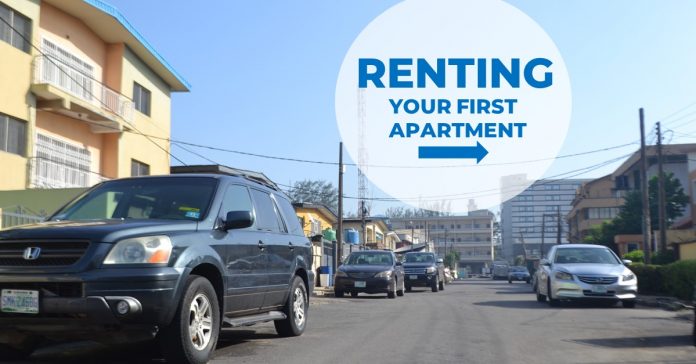When you starting working and earning your own money, you’ll probably have considered moving out of your parents’ home to rent your own place. Renting your first apartment is a big decision and it is not something you want to rush. Your own space gives you far more flexibility and freedom but careful planning is essential to secure an apartment without any stress.
Budget For Renting Your First Apartment

Before you begin looking at other aspects of renting your first apartment, you must make a decision on precisely how much you intend to spend renting your first apartment. Other things you need to take into consideration when drawing up a budget for your first apartment include:
1. Your Rent in Relation to Your Salary
Your rent should never be more than 25% of your salary. Let us put this into perspective, if you earn N100,000 monthly, you should be able to pay your annual rent by saving 25% of your salary monthly. Going by our calculation, if you earn N1.2 million annually, your rent should never be more than N300,000 annually.
2. The Number of Months Your Rent Covers
Don’t assume that your rent will always be paid on an annual basis. There are landlords in Nigeria who insist on asking you to pay rent that covers 2 years. Some landlords and property agents even go as far as asking you to pay for one year but ask for commission, agreement and caution covering 2 years. Pay attention to these details.
3. Upfront Costs
In Nigeria, there are payments known as commission, agreement and caution charges. These are completely different from the actual rent. The amount charged for these charges usually falls between N100,000 and N150,000 when renting an apartment in Nigeria. You should factor these costs into your budget. These charges serve as protection for your landlord in a situation where you end up damaging the apartment. Please note that if you don’t damage anything in the apartment, you are entitled to getting your money back whenever you decide to move out.
4. Long-Term Costs
Don’t make the mistake of assuming that once you pay your rent and additional upfront costs, you are covered. The reality is that there are other long-term costs you need to factor into your budget. An example of this is serviced apartments in Lagos. Such apartments come with additional costs that make living more comfortable and satisfying. Long-term costs also extend to things you’ll have to pay for on a monthly basis. Such expenses include gas, electricity, waste disposal units and security levies.
Location Matters When Renting Your First Apartment

After you have finalised on your budget, the next thing card on your table is the location. The location of your first apartment is as important as the apartment itself. Before you settle for any location, there are certain factors you need to consider.
1. The Character of the Neighbourhood or Location
Before you pick any location, consider the character of the neighbourhood. Is it a residential location? Does the place have a lot of outdoor space or is it packed with stores and commercial activity? Ensure the character of the location blends with your personality. If you have a preference for sea breeze, posh restaurants and bars and high profile neighbours, places like Victoria Island, Ikoyi and Lekki in Lagos would appeal to you. However, if you prefer the bubbly side of living on the Lagos mainland as well as gated estates and shopping malls, Ikeja and Surulere would appeal to you. If you have a soft spot for a neighbourhood totally devoid is high rise buildings yet stands close to nature and borders with the Atlantic sea, Ajah would make a perfect choice.
2. Proximity to Work
The distance from where you live to where you work is a major factor to consider before making a decision. Don’t rent an apartment in a location that is excessively far from your place of work. The only exception to this is if you work remotely. If you live too far from where the work, you expose yourself to stress and fatigue. You should note that if you work in a prime neighbourhood, you would notice that the rent charged for apartments decreases the farther away you move from where your office is located. The way out of this is to strike a balance because the further away you live, the more you will spend on transportation.
3. Road Network
If you live close to where you work yet you have a bad road network connecting your residence to your place of work, you risk finding yourself in a dilemma. This is because even when you leave home in good time, you’re likely to get to work late. The same scenario will most likely play out on your way home. You should pay attention to the road network when checking out apartments.
4. Distance to Essential Shops and Services
Essential services are those things that you’re going to need from time to time. Don’t rent an apartment in a location where you have to drive over 30 miles to buy a fresh roll of tape or detergent. The same applies to gauging your flat tire or getting a haircut. Ensure these services are within walking distance or at work, not more than a 10-minute drive.
Relocating Plans After Renting Your First Apartment

Paying for the apartment is just one half of renting your first apartment. Relocating is another phase of the experience. There are a few things you should bear in mind when planning for a relocation.
1. Relocation Checklist
If possible, draw up a relocation checklist. This list goes a long way in ensuring that the relocation exercise stays organised.
2. Friends and Professional Movers
If you have a good number of friends, you could ask them to help you with your relocation especially if your relocation date falls on a day when their schedule can accommodate your request. If your friends are busy and you can’t do it yourself, consider hiring a moving company to help you move your things. One advantage of using movers is that they are professionals who have offered similar services to several others.
A Roommate Might Not be a Bad Idea

After you have decided on a location and budget, you could consider getting a roommate. Having one comes with certain benefits as we will find out in the lines below.
1. Splitting the Rent
Instead of paying the entire rent by yourself, having a roommate comes with the option of splitting your rent with someone. The percentage will depend on what you and your potential roommate agree on. It could, for instance, be a 50-50 arrangement where both of you split the rent in half. This usually means your roommate has just as much right as you have to the apartment and its facilities.
2. Signing the Lease
Regardless of who your roommate is, you need to get him/her to sign the lease because this is the only document that shows how much right each party has to the apartment. In the situation where a potential roommate chooses not to sign the lease, you might have problems in the future if he/she decides to stops paying his/her portion of the rent. Don’t hesitate to say ‘no’ to a prospective roommate.
Don’t Forget the Inspection

When you eventually make up your mind on renting an apartment, don’t pay for the house until you have carried out a thorough inspection of the house. Before you rent an apartment, you should pay attention to certain things.
1. Security
Take a very good look at the doors to see if there are any signs of an attempted break-in. CHeck all the deadbolts in the house and ensure that all of them are in fine working condition. This would also be a very good time to ask if you are allowed to add additional deadbolts if you decide to do so. Check out the windows to see if they close and open without any problem. Take a look at the lights on the exterior of the house and ensure they are all in good working condition.
2. Bedrooms
Some apartments have closets that have mould. Also be on the lookout for broken shelves and leaking roofs. Take out some time to see if the electrical outlets are in good working condition. Remember to take note of anything that seems off.
3. Living Room
Does the living room have adequate lighting and ventilation? Take a walk around the living room and inspect the walls and windows for moulds. Are there cockroach and rat droppings in the closets and corners of the living room?
4. Bathrooms
Test the shower to be sure it works well. Also, check the water heater to ensure it is functional. You should flush the toilet and listen for leaking sounds that indicate that you might have a problem in the near future. Also, be sure to check that the water pressure is decent. Be on the lookout for leaking pipes as well.
5. Kitchen
Does the kitchen have windows or an extractor? If you find anything broken or in need of repair, get the property agent to give you a written note detailing when the repair work would be carried out.
Things You Need When Renting Your First Apartment

There are certain things you will need in your first apartment that make life comfortable and enjoyable. These consist of basis furnishing and other things that blend with your personality.
1. Furnishing
For your first apartment, you’ll need to start small except you’re working on a really huge budget. Consider getting a bed, a couch, a table and some chairs, throw pillows, towels and cooking utensils except you have a monthly budget that caters to eating out.
2. Electronics
This will depend on your taste for gadgets and electronic devices. If your taste is on the simple side, you will have a TV, a home theatre system and a refrigerator. If you’re a techie or gamer, then your needs will apparently include more gadgets and devices.
Things You Don’t Need When Renting Your First Apartment
The fact that you are moving into your first apartment doesn’t mean you should necessarily move everything you owned in your parent’s home into your new house. Bringing in a lot of things can give you a feeling that you’re filling up your apartment but by the time you start decorating, you will realise the error of this choice.
1. Purge Your Apartment
If you already made the mistake of moving everything you own into your apartment without finding out if you really need them, then you need to purge your apartment. For instance, if you own two high-end laptops and you still have a desktop, you should consider giving out the desktop computer especially if you have been holding onto it for sentimental reasons.
2. Donate, Sell or Thrash Items
Instead of thrashing all the items you have decided that you don’t need, consider donating them to NGOs and homes or selling them to make money. Down the line, you’ll be glad you got rid of them.
Final Thoughts
When renting your first apartment, keep your eyes open and don’t hesitate to ask questions when you notice anything you’re concerned about. Make sure you can consistently pay your rent delaying payment and consider speaking with real estate experts for insights and guidance.









